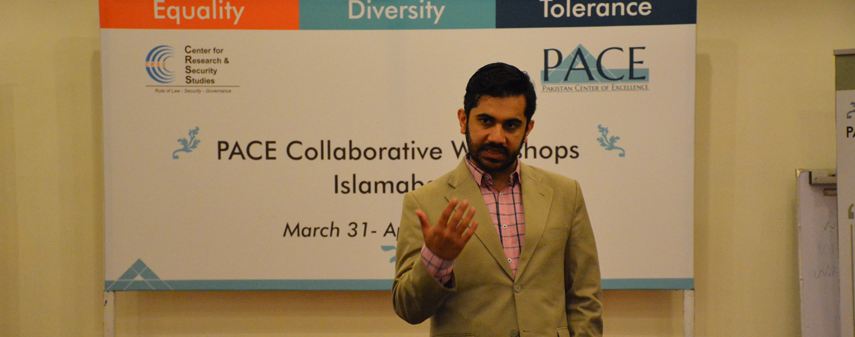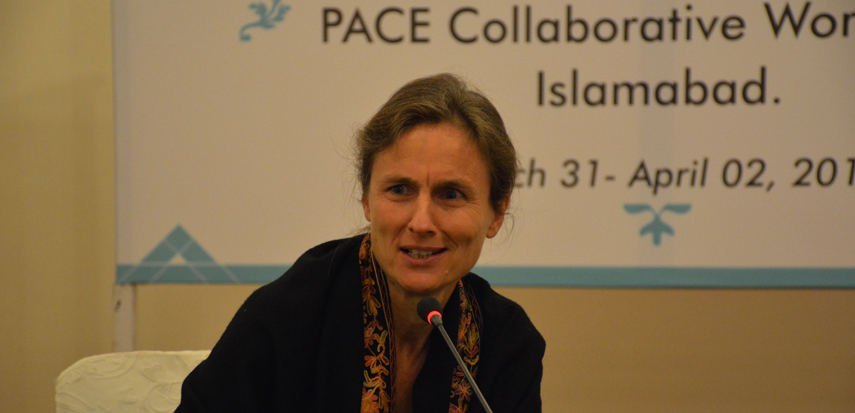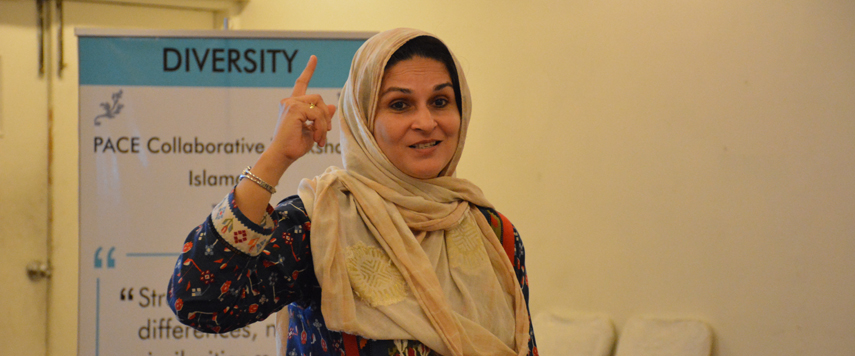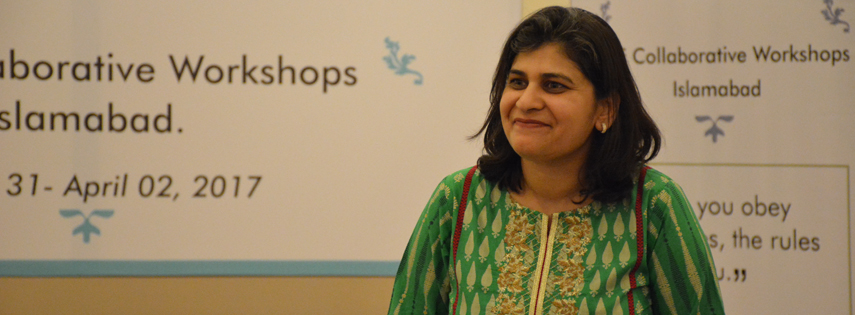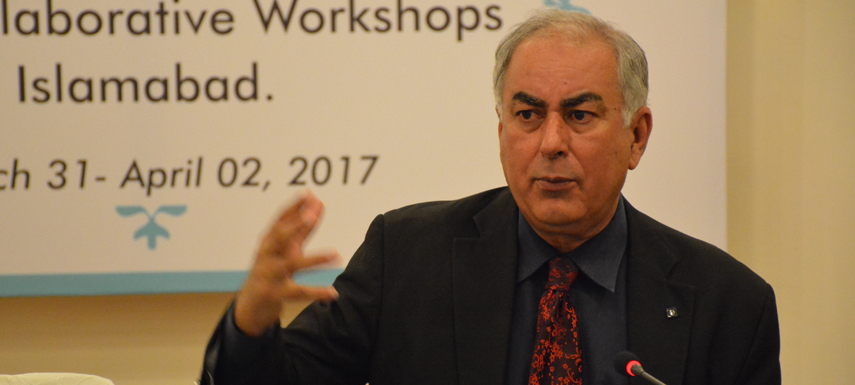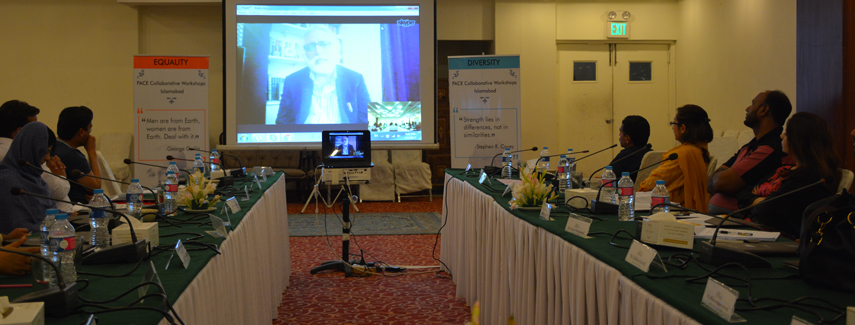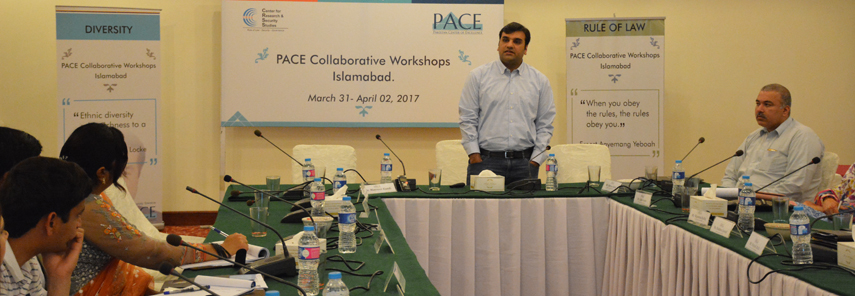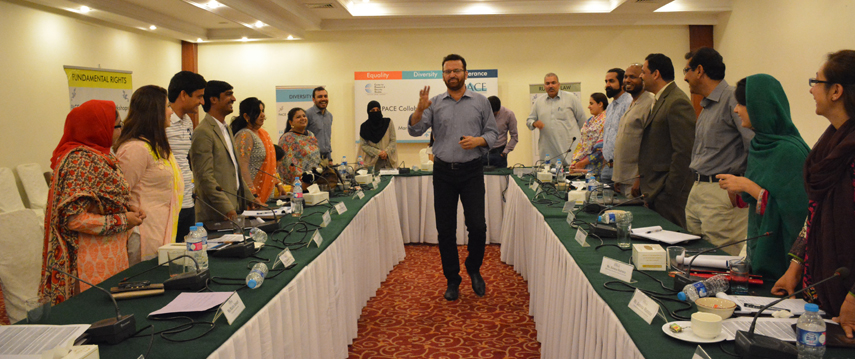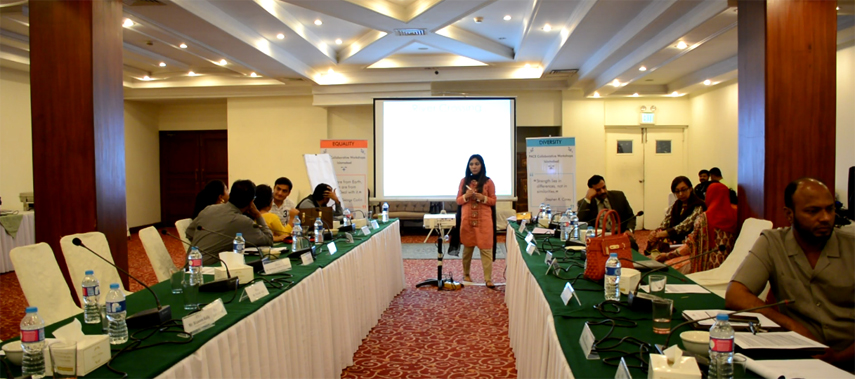OPENING CEREMONY
Mr. Zeeshan Salahuddin, Project Manager, welcoming the participants to the workshop said that PACE workshops gather a diverse group of university teachers from all across Pakistan every month to pull together a wide spectrum of ideas. “Teachers are the real gate keepers of the society because they are shaping future generations and are greatly influencing the lives of their students in multifarious ways,” he said. Introducing the PACE project he said that it is an initiative by CRSS to counter radicalization, inculcate critical thinking, question preconceived notions and narratives, and embed a national discourse in constitutionalism and rule of law.
Her Excellency, Ambassador Jeanette Seppen of Netherlands was the chief guest of the opening ceremony. She shared her views saying that the Dutch Government is proud to initiate this program in Pakistan. Netherlands is a solid partner of Pakistan both in the field of sustainable trade and development as well as in the field of human rights, peace, stability and security. We strongly bond over trade and investment than we do in human rights and security. Both are key ingredients to a peaceful and stable, not only Pakistan, but to the whole world. As global citizens, we have certain things to address and we firmly believe in dialogue; dialogue as an important tool to sort differences out. She said that it is not the Dutch Government’s task to instruct or guide Pakistan in taking the country forward but being international partners, it is our responsibility to work together for a peaceful and nonviolent society.
She shared that freedom of expression is not only in danger in Pakistan, but also in Europe and Netherlands. “As a European citizen, I have been anxious regarding Brexit. I believe in political experiments but more than that of the European Union which came out as an outcome of WWII in which many lives were lost,” she said. Continuing the conversation in an informal manner she said that the World Wars were the outcome of the intolerance of people; not accepting other people for who they were. During the vicious regime, in Germany and Europe, people of other religious denominations, sexual orientations and certain societal classes were not welcomed. She said that Netherlands was also very much involved in the WWII not only in Europe, but also in Asia. Netherlands ruled over Indonesia; Dutch people, as well as Indonesians in Indonesia, suffered immensely because they didn’t accept each other. She said, “We recently celebrated sixty years of the Treaty of Rome which was one of the basics of setting up of the EU: that is now crackling.” She shared with the participants that Europe suffered greatly because there was not enough critical thinking in its history. Despite being one of the most highly educated parts of the world, people followed a doctrine of divisiveness without much thought during WWII.
She shared that Netherlands just had elections that ran between 28 parties. The turnout was higher than ever. She referred the changes to happenings in the global world order like Brexit, election of President Trump, or the controversy between Turkey and Netherlands.
She said that she was always encouraged at her school to ask why and to speak out about things that agonized her. She was provided with responses and grievances to address. This is crucial for critical thinking, which leads to nation and peace building. It is very important to instill in the teachers and students the idea of asking the right question, and thinking critically. Don’t accept what is being said by others but accept others for who they are.
WORKSHOP CORE AREAS
The young professionals were trained in following areas:
- Leadership and motivation
- Equal citizenry and respect for rule of law
- Fundamentals of democracy, governance and accountability
- Respect for diversity, opinions and rights
- Rights of minorities and other marginalized groups
- Constitutionalism, and adherence to Pakistan’s Constitution, particularly articles 8-28
- The importance of asking critical questions in the pursuit of knowledge
PLURALISM AND MULTICULTURALISM, MS. HUMAIRA MASIHUDDIN
Ms. Humaira Masihuddin kicked off the first formal session of the day speaking on the theme of ‘Pluralism and Multiculturalism’. She said that human beings belong to one origin and one place, she said, and no purely homogeneous society exists in the modern world. Most societies consist of different ethnic groups. She defined minorities as a group of people who are singled out from the other groups and are treated differently because of their physical or cultural characteristics. Minority is a subordinate group as opposed to the dominant group.
The concept of multiculturalism revolves around a society with heterogeneous beliefs and set of ideas. Multiculturalism makes a society diverse. Respect for diversity shapes coexistence, peace, and harmony under a political and institutional framework. Differences are not challenges and do not impose any limitation on growth of an individual or society. Every individual has a right to be different and be respected by all. In Islam, the concept of diversity is clearly inclusive, she continued. In Quran, she said, humans are addressed to treat one another without any discrimination and respect each other’s beliefs and should never use abusive language or show disrespect towards others. If we look at the character of the Holy Prophet (PBUH), it is evident how He always respected the non-Muslims in Mekkah and Medina. Even on the day Mekkah was conquered by the Muslims, Prophet (PBUH) forgave all His enemies for the harms that they had inflicted on Him. Ms. Humaira also made note of the last sermon of the Holy Prophet that said “All mankind is from Adam and Eve, an Arab has no superiority over a non-Arab nor a non-Arab has any superiority over an Arab; also a white has no superiority over black nor a black has any superiority over white except by piety (taqwa) and good action.” In short, Islam is the religion of tolerance and coexistence, love and peace for others regardless of their religion or ethnicity.
RULE OF LAW, MS.GULMINA BILAL
Ms. Gulmina Bilal shared her thoughts on the topic of “rule of law”. She discussed that laws should protect citizens against anarchy and should allow people to plan their affairs with reasonable confidence. In doing so, they know in advance the legal consequences of various actions. It guarantees against at least some types of official arbitrariness.
She discussed the elements of rule of law as a set of guidelines to the people that they must understand and comply with it. Efficacy, stability, supremacy of legal authority and impartial justice system was also discussed as elements of the rule of law. She, furthermore, expanded her views on goals of the rule of law as following:
- making the state abide by the law
- ensuring equality before the law
- supplying law and order
- providing efficient and impartial justice
- upholding human rights
She shared that with the establishment of rule of law the State monopolizes the use of force and individuals are secure in their persons and property. State is itself bound by laws and does not act arbitrarily and individuals have meaningful access to an effective and impartial legal system. She shared that the state protects basic human rights and fundamental freedoms and individuals rely on the existence of justice institutions and the content of law in the conduct of their daily lives.
FUNDAMENTALS OF DEMOCRACY, GOVERNANCE AND ACCOUNTABILITY, Dr. MANSOOR AKBAR KUNDI
Dr. Mansoor Akbar Kundi was the first speaker on the second day and spoke on the fundamentals of democracy, governance and accountability. He shared his views saying that democracy is like a hat that everyone wishes to wear. Noise and indiscipline of democracy, in the longer run, is far better than silence and discipline of dictatorship. Power, legitimacy, and governance are some of the basic elements of democracy. Democracy is one of the oldest government systems but then it was known as city states that later on converted into empires. Later on, nation states emerged out of the empires.
Democracy has proven itself the best government system. Citizens have experienced different forms of governments in the past such as aristocracy, dictatorship, and dictatorship of the religion. Islamic history has also gone through the same phases; such as dynastical rule by a few families.
He took the participants back into the history of democracy that evolved through different stages. Citizens have experienced different forms of governments in the past such as aristocracy, dictatorship, and dictatorship of the religion. Islamic history has also gone through the same phases; such as dynastic rule by a few families. Across these historical phases, democracy has emerged as the best state system. Among other forms of democracy are parliamentary and presidential systems.
The first factor for democracy is education, followed by able leadership, accountability and strong institutions. Fostering discussion around aspects of democracy i.e. outward and inward appearances, he said that the outward appearance is the structural election process whereas inward appearance deals with the accountability of the representatives of the people. The inward appearance is the true spirit of the democracy.
RESPECT FOR DIVERSITY AND TOLERANCE IN THE SOCIETY: THE BREXIT CASE, MR. TOAHA QURESHI
Dr. Toaha Qureshi was second speaker of the day and he spoke on the topic of ‘Respect for Diversity and Tolerance in the Society: the Brexit Case’. Dr. Qureshi shared that Americans in general are of the opinion that they believe in diversity: because they had Barrack Obama, a black man as a president. This phenomenon is not limited to the Americans only but the United Kingdom, too, a person of Pakistani origin became the chairperson of the Conservative Party. Opposition in UK elected Mr. Sadiq Khan (Pakistani) as the mayor of London.
He stimulated the discussion saying that diversity means to tolerate as well as acceptance of the differences. Acceptance is most desirable for the development of a multi-cultural society. In Britain, people are more tolerant and they accept other people with more respect. In other European countries, Muslims are not as free as in the UK.
When you look at the Brexit situation, extremist parties propagate among the masses that Britain is being taken over by the poor European countries. They say that Romanian and Polish people are moving to the UK and taking over their resources. Unfortunately, many attacks happened before Brexit and after the referendum. The British Government allowed for a democratic process; if British people vote to dismiss out of the European Union.
All political parties, in the UK, have different ethnic minority representation in their parliament. Labor party is the largest party having the biggest number of the Asians in the parliament. It took years to engage with the mainstream political parties and make them realize that unless they involve minorities in politics and decision making, change is not going to happen. They wanted to address radicalization and extremism. Britain is on a very high level of accepting diverse groups not in the political system but in trade and development. There are very friendly relations between minorities and indigenous people.
Diversity, in the UK, is about all the standards that we see in European countries or in USA. Britain is leading in acceptance of diversity. There are many legislation and businesses for diverse groups of people. Women are equally participating in the politics and jobs. Though, they are paid less than men but still they are coming out to participate in mainstream politics and businesses. He opined that diversity should be introduced as the integral part of the system with gender balanced process of recruitment. Collective and conducive environments should be created for women with respect, dignity and prestige. Womanhood should not come in the way of progression. Having diverse community and having women as part of that community should be celebrated.
MEDIA & ETHICS, MR. AMMAD KHALIQUE
Mr. Ammad Khalique kicked off his session on “Media & Ethics”. He started with the definition of “Media” and “Ethics”, media is the collective communication outlet or tool that is used to store and deliver information or data. Specialized mass media channels include print media, social/digital media, photography, advertising, cinema, and broadcasting (Radio, TV). Speaking on the freedom of expression, he referred to the Article 19 of UN Charter, “Everyone has the right to freedom of opinion and expression; this right includes freedom to hold opinions without interference and to seek, receive and impart information and ideas through any media and regardless of frontiers.”
He defined ethics as the way people behave based on their beliefs about what is right and wrong and how it influences their behaviors and values. He shared his views on ethics in journalism with the following points:
- Seek truth and report it
- Minimize harm
- Act independently
- Maintain standards of decency
- Be accountable
He also said that being neutral and presenting authentic news is one of the values that should be kept in mind while reporting certain issues. Media is bound in some cases and cannot be open and expose the facts. He said that words are sometimes misinterpreted and other times twisted when reporting sensitive issues; therefore, extreme care should be taken while debating on such issues. He stressed that the reporters while broadcasting should use decent language.
He shared some laws and ethics that are binding upon media:
- Cyber Stalking
- Cyber Bullying
- Cyber Masking
- Cyber Frauds
- Hate Speech
- Defamation
- Intrusion to Privacy
- Harassment
- Cyber Crime Bill 2016
- Cyber Wing (FIA)
Mr. Safiullah Gul was the last speaker of the workshop and spoke on the topic of ‘Leadership and Motivation’. He began with the saying that “he who fails to plan actually plans to fail” and shared stories of people who alone have changed the course of history, with motivation and persistence, despite all the opposition.
He said that successful leadership determines the extent of efforts directed towards a certain goal. He presented his model of goal-seeking i.e. activation, persistence and intensity. “Being alone doesn’t actually matter if you have goals and objectives set in your mind. To achieve these goals, you actually need to overcome your fears and insecurities. An individual sometimes can set an example and be motivation for others,” he shared.
The session, filled with activities to enhance creative and critical thinking, focused on looking at things from a slightly different perspective to encourage problem-solving.
Closing Ceremony
Ms. Farhana Kanwal, Project Coordinator PACE, in her concluding remarks, insisted that there is a dire need to revisit the widespread preconceived notions that have been passed through cultural values in the society over generations. Teachers, with the responsibility of imparting values to the young generation in educational institutions, are the most valuable engines that can challenge common negative narratives that promote hatred and bigotry. She said that teachers have the ability to shape an entire generation’s mindset to propagate tolerance, diversity and equality.
She shared that the participants need to conduct these activities with their students to inculcate adherence to the rule of law and equal citizenry. CRSS provides financial and logistic support in this regard to lecturers and professors so that they can foster the universal ideals of tolerance and diversity in the young generations.

